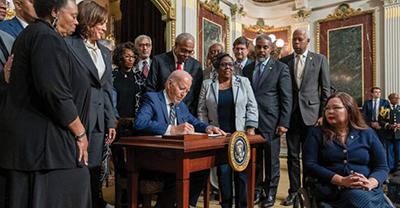
As the re-election campaign unfolds and despite historic achievements for the Black community, the Biden administration still faces the challenge of addressing the concerns within the African American community, particularly the perceived neglect of the Black Press of America. Balancing economic achievements with community-specific outreach will be crucial in securing support from this vital demographic.
By Stacy M. Brown, NNPA Newswire Senior National Correspondent@StacyBrownMedia
As the 2024 presidential election race kicks into high gear, President Joe Biden’s re-election campaign is facing a stall among African Americans, coupled with concerns over the campaign’s perceived neglect of the Black Press of America—the community’s trusted voice for nearly two centuries. Despite those reservations, the White House is eager to showcase the unprecedented accomplishments of the Biden-Harris administration, particularly in economic growth and equity.
The former vice president noted that, as president, he would help families buy their first home and build wealth by creating a new refundable, advanceable tax credit of up to $15,000.
“The data shows that the historic public investments that make up the Biden-Harris Administration’s economic agenda in critical sectors for future growth, resiliency, and security are beginning to come to fruition,” White House officials stated in a blog, adding that, nevertheless, there is more work to do to lower costs for American families and ensure Americans feel the benefit of continued real wage growth, a strong labor market, and declining inflation.
In the blog post titled “Ten Charts That Explain the U.S. Economy in 2023,” the White House underscored historic gains for women and Black workers, noting that the administration’s economic agenda is beginning to yield positive results. However, amidst the achievements, there remains acknowledgment of the ongoing work required to lower costs for American families and ensure the widespread benefits of economic growth, labor market strength, and declining inflation.
The blog detailed key economic indicators, including surpassing the private consensus for real economic growth in 2023 and the positive impact on consumer spending. The Inflation Reduction Act was highlighted as a significant factor in the historic manufacturing boom, leading to record levels of real private manufacturing construction investment.
Job gains in 2023 continued robustly, contributing to 14.1 million jobs added under the Biden administration through November. The unemployment rate, maintaining a streak below 4% for 22 months, achieved a milestone not seen in over 50 years.
The administration indicated a downward trend, along with real wage growth and a decrease in wage inequality, despite a peak in inflation in the summer of 2022. Historic union activity in 2023 was cited as a reason for optimism, contributing to the highest rate of prime-age women participating in the labor force since 1948.
African Americans’ worries, however, continue to grow because of what they perceive to be the Biden campaign’s underinvestment in the Black Press of America. The influential media conglomerate, which the National Newspaper Publishers Association represents, has served as the community’s most trusted voice for nearly two centuries, and its omission from the campaign strategy hasn’t helped to quell questions about the administration’s commitment to addressing the specific needs and concerns of African Americans.
Still, Biden’s commitment to supporting Black entrepreneurs was emphasized in the blog, highlighting significant investments, including nearly $70 billion in federal contracts awarded to small, disadvantaged businesses in FY 2022. Additionally, $12 billion was allocated to community lenders to expand access to capital and resources for often sidelined entrepreneurs.
The U.S. Department of Treasury estimated that those investments in community lenders would result in a $50 billion increase in lending to Latino communities and nearly $80 billion to Black communities over the next decade. The administration earmarked another $10 billion for states, tribes, and territories to launch and expand capital access programs for approximately 100,000 small businesses.
As the re-election campaign unfolds and despite historic achievements for the Black community, the Biden administration still faces the challenge of addressing the concerns within the African American community, particularly the perceived neglect of the Black Press of America. Balancing economic achievements with community-specific outreach will be crucial in securing support from this vital demographic.





Be the first to comment